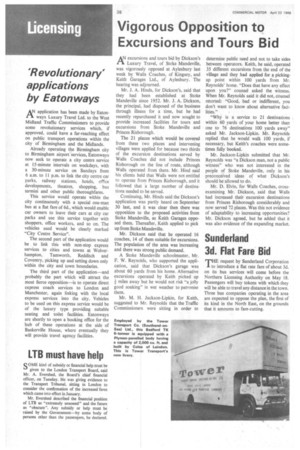Vigorous Opposition to Excursions and Tours Bid
Page 40

If you've noticed an error in this article please click here to report it so we can fix it.
Al excursions and tours bid by Dickson's Luxury Travel, of Stoke Mandeville, was vigorously opposed at Aylesbury last week by Walls Coaches, of Kingsey, and Keith Garages Ltd., of Aylesbury. The hearing was adjourned.
Mr. J. A. Hinds, for Dickson's, said that they had been established at Stoke Mandeville since 1952. Mr. J. A. Dickson, the principal, had disposed of the business through illness for a time, but he had recently repurchased it and now sought to provide increased facilities for tours and excursions from Stoke Mandeville and Princes Risborough.
The 21 places which would be covered from these two places and intervening villages were applied for because two thirds of the excursion destinations served by Walls Coaches did not include Princes Risborough on the line of route, although Walls operated from there. Mr. Hind said his clients held that Walls were not entitled to operate from Princes Risborough, and it followed that a large number of destinations needed to be served.
Continuing, Mr. Hinds said the Dickson's application was partly heard on September 30 last, and it was clear then there was opposition to the proposed activities from Stoke Mandeville, as Keith Garages opposed them. Thereafter, Keith applied to pick up from Stoke Mandeville.
Mr. Dickson said that he operated 16 coaches, 14 of them suitable for excursions. The population of the area was increasing and there was strong public demand.
A Stoke Mandeville schoolmaster, Mr. F. W. Reynolds, who supported the application, said that Dickson's garage was about 60 yards from his home. Alternative excursions operated by Keith picked up miles away but he would not risk "a jolly good soaking" in wet weather to patronise them.
Mr. M. H. Jackson-Lipkin, for Keith, suggested to Mr. Reynolds that the Traffic Commissioners were sitting in order to determine public need and not to take sides between operators. Keith, he said, operated 35 different excursions from the end of the village and they had applied for a pickingup point within 100 yards from Mr. Reynolds' horrie. "Does that have any effect upon you?" counsel asked the witness. When Mr. Reynolds said it did not, counsel retorted: "Good, bad or indifferent, you don't want to know about alternative faci lities."
"Whyis a service to 21 destinations within 60 yards of your home better than one to 76 destinations 100 yards away" asked Mr. Jackson-Lipkin. Mr. Reynolds replied that he would walk 100 yards, if necessary, but Keith's coaches were sometimes fully booked.
Mr. Jackson-Lipkin submitted that Mr. Reynolds was "a Dickson man, not a public witness" who was not interested in the people of Stoke Mandeville, only in his preconceived ideas of what Dickson's should be allowed to do.
Mr. D. Elvin, for Walls Coaches, crossexamining Mr. Dickson, said that Walls had increased their excursion destinations from Princes Risborough considerably and now served 72 places. Was this not evidence of adaptability to increasing opportunities? Mr. Dickson agreed, but he added that it was also evidence of the expanding market.




























































































































